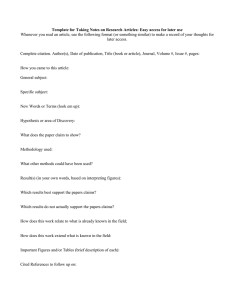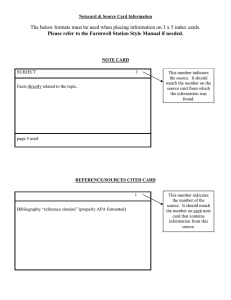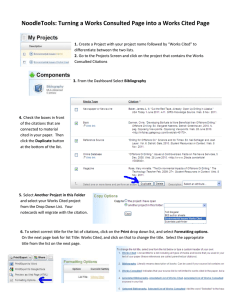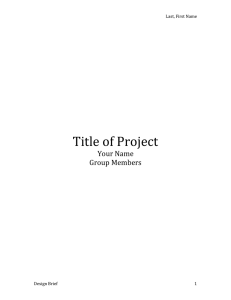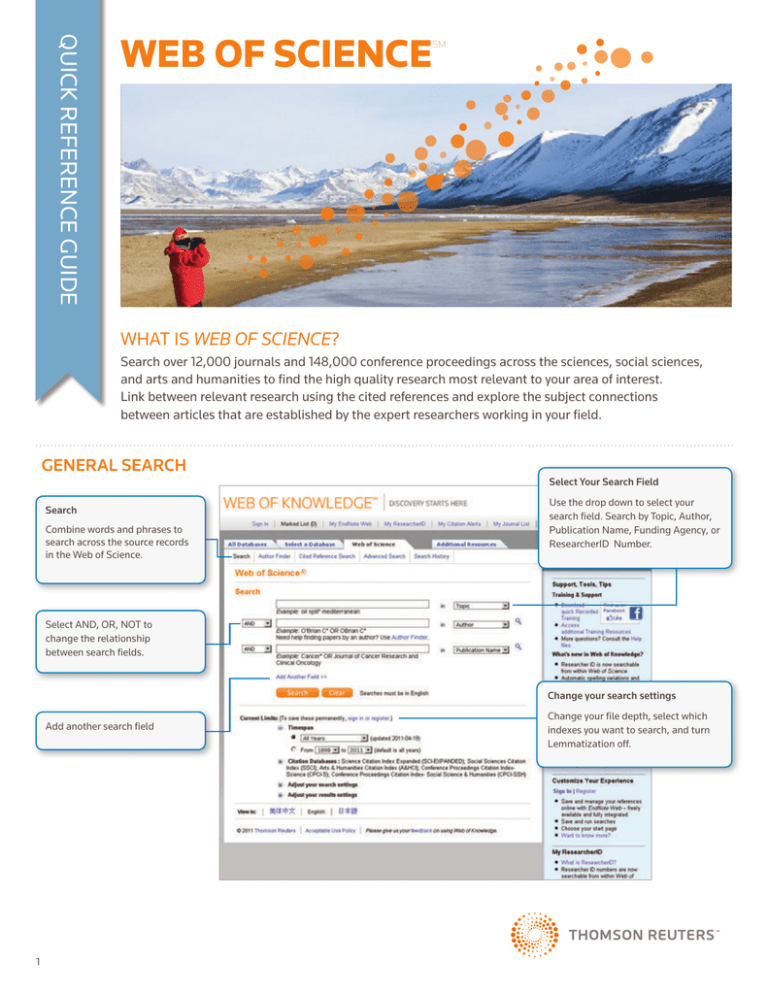
QUICK REFERENCE GUIDE
WEB OF SCIENCE
SM
T
TMTMTt
WHAT IS WEB OF SCIENCE?
Search over 12,000 journals and 148,000 conference proceedings across the sciences, social sciences,
and arts and humanities to find the high quality research most relevant to your area of interest.
Link between relevant research using the cited references and explore the subject connections
between articles that are established by the expert researchers working in your field.
GENERAL SEARCH
Search
Combine words and phrases to
search across the source records
in the Web of Science.
Select Your Search Field
Use the drop down to select your
search field. Search by Topic, Author,
Publication Name, Funding Agency, or
ResearcherID Number.
Select AND, OR, NOT to
change the relationship
between search fields.
Change your search settings
Add another search field
1
Change your file depth, select which
indexes you want to search, and turn
Lemmatization off.
SEARCH ESSENTIALS
Search Operators
to find records containing all terms
Use
AND
Use
OR
to find records containing any of the terms
Use
NOT
to exclude records containing certain words from your search
Use NEAR/n to find records containing all terms within a certain number of words (n) of each other (stress NEAR/3 sleep)
Use
SAME
in an Address search to find terms in the same line of the address (Tulane SAME Chem)
Stemming, Stop Words, and Spelling Variants
All words are searched (no Stop Words )
British/English spellings are searched automatically (search behavior to find both behavior and behaviour)
Lemmatization automatically helps find variations by stemming for plurals (even complex plurals like tooth/teeth) and
searching different verb tenses (run/running) and degrees of comparison (big finds bigger and biggest). Lemmatization can be
turned off by enclosing terms in quotation marks.
Wild Card Characters
Use truncation for more control of the retrieval of plurals and variant spellings with Lemmatization turned off.
*
= zero to many characters
?
= one character
$
= zero or one character
Phrase searching
To search exact phrases in Topic or Title searches, enclose a phrase in quotation marks.
For example, the query “energy conservation” finds records containing the exact phrase energy conservation.
Parentheses
Use parentheses to group compound Boolean statements. For example:
(river or stream or pond) and (“waste water” or pollution)
Author Name
Enter the last name first, followed by a space and up to five initials.
Use truncation and search alternative spelling to find name variants:
Driscoll C* finds Driscoll C, Driscoll CM, Driscoll Charles, and so on.
Driscoll finds all authors with the last name Driscoll
De la Cruz f* OR Delacruz f* finds Delacruz FM, De La Cruz FM, and so on.
2
FULL RECORD
Titles
Full titles are indexed
and searchable.
Link to full text and/or library
holdings information.
Authors
All authors are indexed.
Search using last name and
initials (e.g. garfield e*)
Cited Reference
Click on the Cited Reference
number to move to the Cited
Reference view of this record.
Abstract
All abstracts are indexed
as provided by the journal
(1991 to present).
Author Keywords and
KeyWords Plus
Author Keywords are indexed
and searchable. KeyWords Plus
are words and phrases harvested
from the titles of the cited
articles.
Addresses
All author addresses are indexed
and searchable. Reprint author
e-mail addresses are listed when
available. Common address
terms will be truncated
(Univ, Coll, Hosp, etc.).
Funding Information
Funding agency, grant
numbers, and the funding
acknowledgement text is
searchable (2008 to present).
ResearcherID
Times Cited Counts
Times cited counts for the Web of ScienceSM (all editions)
and Web of KnowledgeSM (including Web of Science, Biosis
Citation Index, and Chinese Science Citation Database) are
displayed on each record. Counts reflect all correct citations
and are not limited by your subscription.
ResearcherIDs are searchable
and displayed when available.
ResearcherIDs are harvested
from public profiles at
www.researcherid.com.
3
CITED REFERENCES
All cited references are indexed
and searchable via Cited
Reference Search. Click the
“References” link on the full
record to move to the cited
reference view.
Related Records
Click Related Records to find
other articles that have cited the
same works.
Click the article title to move to a
full record.
Unlinked References
Reference that are not linked to full records
will display in plain text and include:
Cited References will display
current times cited count in the
Web of Science and links to full
text when available.
Citations to documents not indexed
in Web of Science
Citations to Journal Articles
outside of your subscription year
Citation variants
SEARCH RESULTS SUMMARY
Sort results
by publication date (default), times cited, source or first author name.
Click the article title
to move to the full record. Links to full-text may also be
available (subscription required).
Refine your results
Use Refine to mine your full set of results to find
the top 100 Subject Categories, Source Titles,
Publication Years, Authors, or Funding Agencies.
Output search results
Export to bibliographic management tools like EndNote®,
EndNote® Web, or Reference Manager®. Or save as text, email,
or add up to 5,000 records to your temporary Marked List.
4
CITED REFERENCE SEARCH
Step One
Search by Cited Author,
Cited Work, Cited Year,
Volume, Issue, or Page
Use the Journal
Abbreviations List for help
with abbreviations
Step Two
Select the references,
including variants, to
include in your search, then
click “Finish Search” to
display your search results.
View the Full Record
Search Tips:
• Use truncation on cited author and cited work.
• Look for variants (sometimes papers are cited incorrectly)
before finishing your search
• The “Citing Articles” count reflects citations from all years
and all editions of the Web of Science – even those years
and editions you don’t subscribe to.
• All cited references are indexed and searchable, including
references to books, patents, government documents, etc.
• Secondary cited authors, full source titles, and non-standard
source abbreviations are automatically searched across all source
records in the Web of Knowledge. Keep in mind that a search of
this sort may only return partial results.
5
CITATION MAPPING
Citation map
Click the button to create a
citation map. A citation map will
allow you to explore up to two
generations of backward and
forward citations.
Change the appearance
of your map by adjusting the
color, order, and text displayed
on each node.
Navigate in your map
Click and drag a node to move your
map. Roll over a node to display
additional publication information.
The panels at the bottom of your map
display an overview of your selected
node and a list of all the records in
the map.
CITATION REPORTS
Create a citation report
for search results sets with fewer
than 10,000 results. Click the
link at the top right of a results
summary page, or create a citation
report from the Marked List.
Citation Reports can provide useful
productivity and performance
metrics for a set of results
• publications per year
• citations per year
• H-index (N records with
at least N citations)
• Total Citations for all documents
• Average cites per item
• Number of unique citing articles
6
PERSONALIZE
Create a Web of Knowledge Profile to
• Save searches
• Create Search Alerts
• Create Citation Alerts
• Establish an Endnote Web Library
• Create a ResearcherID profile
Click “Sign In” to register for
a Web of Knowledge Profile
Click “My Citation Alerts” or “My Saved Searches”
to manage your searches and alerts*
Click “Search History” to
view your entire search history.
Run any saved search
Renew alerts (24 weeks for Search Alerts,
one year for Citation Alerts.)
Change your alert settings
Set an RSS Feed
*Search Alerts will be based on the last query in your
search history and will remain active for 24 weeks.
You will be notified two weeks before an alert expires.
Expired alerts will remain in your profile as saved
searches until you delete.
MANAGE RESULTS
EndNote online
This online resource for reference
management and bibliography
creation is fully integrated with
Web of Knowledge. Through this
integration, Web of Knowledge
references will automatically
display their Times Cited Count,
links to Related Records, and
full-text links.
With EndNote online, you can
collect, organize and manage
references and PDFs from online
databases and library catalogs
from around the world.
Use EndNote’s powerful Cite While
You Write tools to add references
and format bibliographies in
documents you are writing.
You can access your library any
time, either from your Web of
Knowledge profile or by going to
my.endnote.com and entering your
Web of Knowledge User ID and
Password.
Share
Organize
Collect
Share your reference
groups with other
EndNote users.
Use “Groups” to
organize your library.
Go to “Collect” to start
searching Library Catalogs
from around the world.
7
QUICK REFERENCE CARD - WEB OF SCIENCE
ResearcherID
ResearcherID is your free, public
online space to establish a
unique ResearcherID number
and create a personal profile.
Your ResearcherID profile can
include information about
your institutional affiliations,
research interests, and a list of
your publications. Publication
information from the Web of
Science will have live citation
information (updated weekly) and
include direct links back
to the source record. Once you
have added your publications,
to your ResearcherID profile, your
unique ResearcherID number
will be automatically associated
with your publications in the Web
of Science, creating a direct link
from the Web of Science record
to your ResearcherID profile.
Click the “Citation Metrics” link to view citation metrics
like the H-index and average citations per record for the
records included in the ResearcherID profile.
GETTING HELP
Click the Help button on any page to get detailed help on
features as well as detailed search tips and examples.
Stay Informed about the Web of Knowledge at: wokinfo.com
Contact the Technical Help Desk for your region at:
science.thomsonreuters.com/support/
Contact the education team at:
science.thomsonreuters.com/info/contacttraining/
For ongoing recorded and live Web-based training, visit:
thomsonreuters.com/products_services/science/training/
Science Head Offices
Americas
Philadelphia +1 800 336 4474
+1 215 386 0100
Europe, Middle East and Africa
London +44 20 7433 4000
Asia Pacific
Singapore Tokyo +65 6775 5088
+81 3 4589 3100
For a complete office list visit:
ip-science.thomsonreuter.com/contact
S SR 1104 532
Copyright ©2013 Thomson Reuters All rights reserved.

